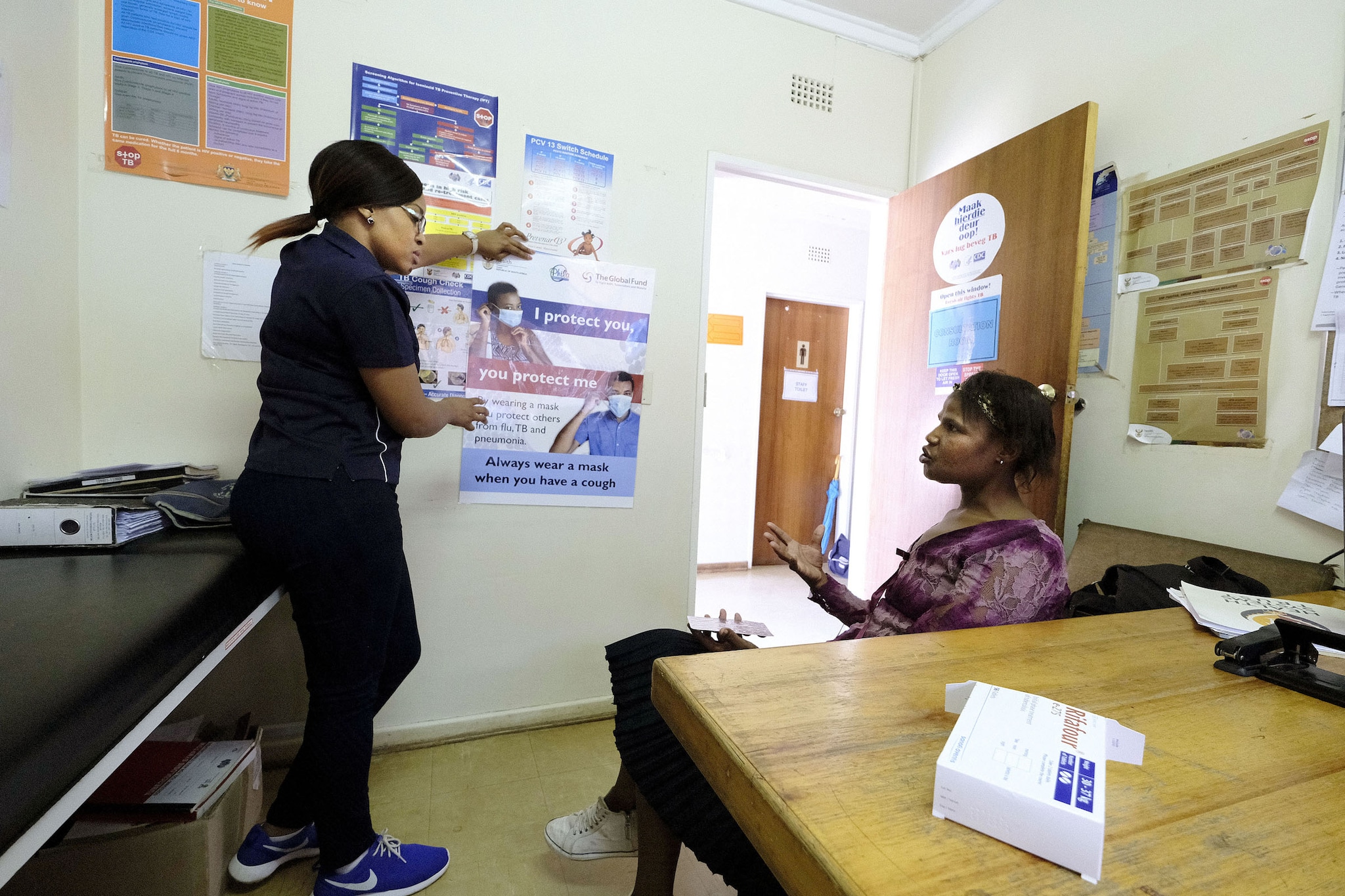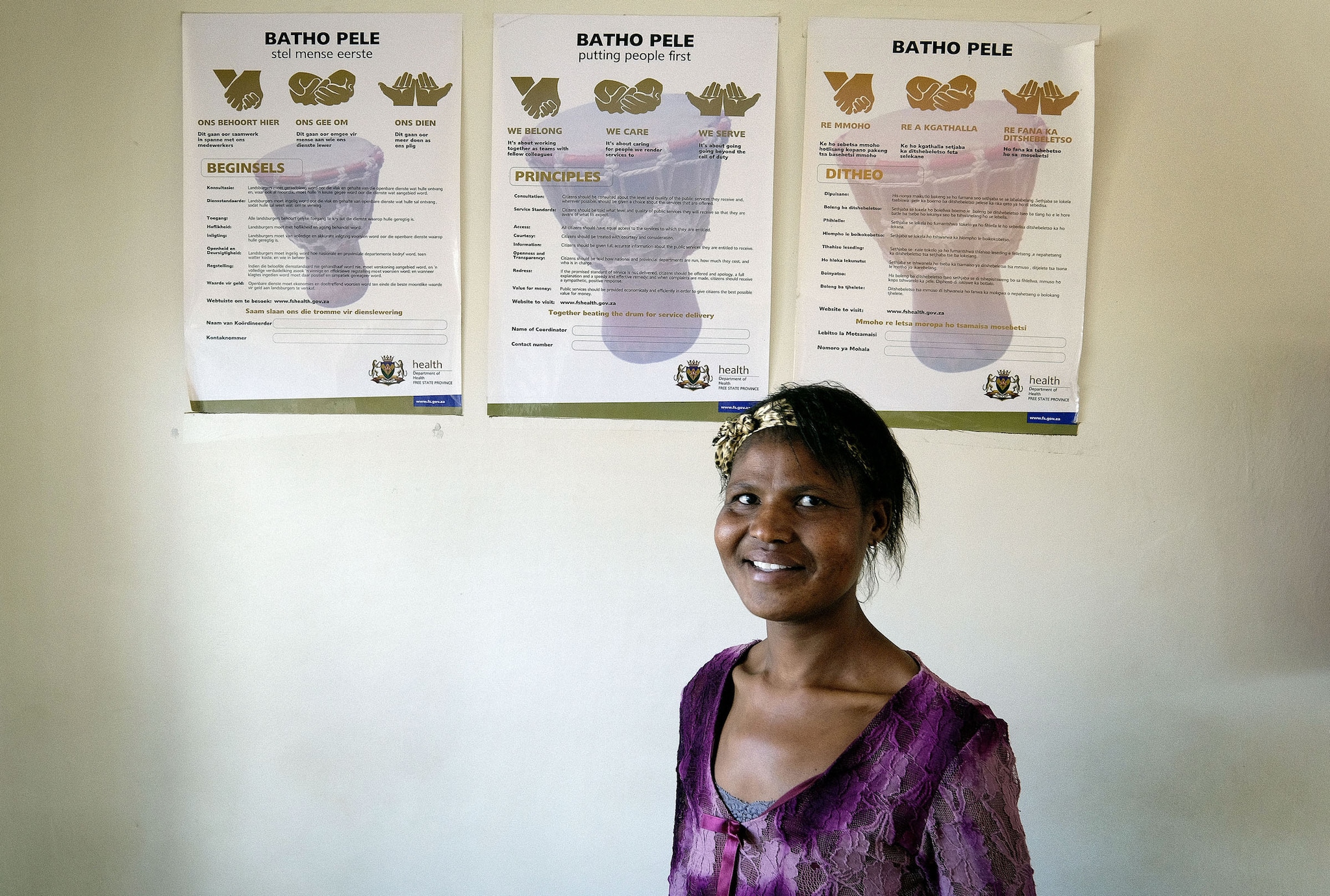How To Create A Call Of Duty Account

Nthabeleng Lefu has an unbreakable bond with her patients. Here she is seen with Nozmanga Dikano
Lejweleputswa District in Free State Province, South Africa, lies amid the famed goldfields, flanked by vast agricultural holdings producing maize and sunflowers that stretch from horizon to horizon. Like the rest of the country, the region is grappling with unemployment, poverty, and the devastating effects of the AIDS and TB epidemics.
At the coalface ‒ where all these factors intersect ‒ is a group of health workers determined that no more lives should be needlessly lost and that rural patients receive excellent service.
Health Systems Trust Nurse Clinician Nthabeleng Lefu embodies this approach: she has already made her mark, as is apparent when she enters the Phahameng Clinic. Patients waiting on benches hail her as an old friend or get up to shake her hand. Several patients are keen to share their stories of how 'Sister Lefu' helped them turn a corner when they felt there was no hope.
In particular, she has been able to assist several patients who were on antiretroviral treatment (ART), but whose health did not seem to improve, despite sputum tests and X-rays for TB coming back negative.
Nozmanga Dikano (36) is happy to see Sister Lefu arrive at the clinic, bounding across the waiting room to hug her and asking: "Do you see how fat I am now, Sister?" Dikano was diagnosed with HIV in 2001 and was treated with Bactrim to prevent opportunistic infections such as pneumocystis pneumonia (PCP). In 2007, she was also diagnosed with TB and started on ART.

Nozmanga Dikano defaulted on treatment, a decision that almost cost her her life
"In 2010 I defaulted on treatment because I was working as a domestic in Bloemfontein [the provincial capital] and my boss wouldn't let me go to the clinic to fetch my medicine. I'm sorry to say that I defaulted for 10 years until I had a baby in 2017. By the time they tested me in the antenatal screening, my CD4 count was at 111 ‒ it is supposed to be at least 350. I already had three children and they are all HIV-negative, so they gave me Nevirapine to prevent me transmitting the virus to my baby during childbirth."
Dikano explains that after the birth she felt extremely weak and tired, unable to walk more than a few steps and struggling to even swallow water.
"I thought it was because I had had a Caesarean section. I was admitted to the provincial hospital for three weeks for low blood pressure because the X-rays didn't show TB. I told the doctor that I'd had TB before and recognized this feeling, but he ignored me and just changed my ARVs. I wasn't getting better. so I discharged myself and came here to my local clinic to tell them what happened. The next day they sent Sister Nthabeleng to my house to fetch me; my face was swollen like a football and I was very dehydrated. My feet were icy cold and I couldn't sleep at all. I thought 'This is it. I am dying.' She examined me and said she thought it was TB, even if it hadn't shown up on the X-rays."
Dikano was placed on TB treatment and rapidly improved. "Within a week I was feeling much better. I have just one more month of treatment, and my baby is on INH (a TB preventive therapy drug) to prevent him contracting TB. When I came back for the first time in a few months, everyone here at the clinic was shocked at how much weight I had gained and how good I look now. Even MaSwanepoel [the Clinic Manager] couldn't believe her eyes."
Dikano's four children, ranging in age from infancy to 18 years old, were so thrilled to see their mother improve that they soon joined in ensuring that she adhered to treatment. "The children will come with my tablets on a tray with a glass of water and say 'OK mama, it's time for your medicine'."
Dikano says that stigma around TB is in some ways worse than the stigma of HIV. "I have been open about my HIV status for 20 years and because I always looked fine, no one was worried. But when I got really sick with TB, even my own siblings wouldn't allow me to stay with them because they were afraid I would infect their children. They know it is highly contagious, and I think I looked so bad that it frightened them."
Now feeling as if she has a new lease on life, Dikano is a passionate advocate for education on TB and HIV: I speak to everyone who will listen about TB and HIV. I want to climb to the top of the mountain and tell the world that TB can be beaten."

Nozmanga Dikano is grateful to the Health Systems Trust nurses for nursing her back to life
"I did a four-year nursing degree and then a postgraduate diploma in health care and another in healthcare management. I like working in primary health care context because there are so many poor and rural people in need of care who can't afford private treatment. It is important to be humble when treating patients so we can have mutual respect.
Even if a patient has a minor ailment, we must make sure that we treat it properly so that they feel safe and that someone is caring for them.
South Africa ranks third-highest in the world in terms of TB burden, with an estimated incidence rate of 834 per 100 000 population in 2014 (about 400% increase over the last 15 years). Compared to HIV-negative people, HIV-positive people are 37 times more likely to contract TB, while about 62% of patients are coinfected with HIV and TB.
We must be creative to ensure the best outcomes for our patients. The most rewarding part of my job is watching patients with HIV and TB improving right in front of my eyes. Then I know that I've done my work properly."
How To Create A Call Of Duty Account
Source: https://www.cdc.gov/globalhealth/countries/southafrica/stories/beyond_the_call_of_duty.html
Posted by: sheltonhemperess.blogspot.com

0 Response to "How To Create A Call Of Duty Account"
Post a Comment